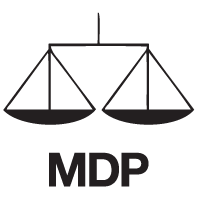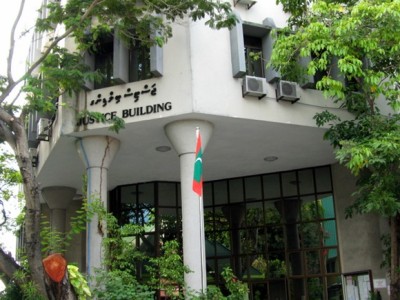A “legal order” from parliament is the last available option to compel three judges of the Hulhumale’ Magistrate Court to attend parliament’s Government Oversight Committee, following their refusal to answer two previous summons, the Maldivian Democratic Party (MDP) said in astatement on Saturday.
The press release stated that “the excuses” offered by the three magistrates on administrative grounds – contending that as judges of the lower courts they doubted whether they could answer questions regarding the Commission of National Inquiry’s report and that they needed to await a decision by the Judicial Service Commission (JSC) – were “reasons that lacked any principle.”
“Therefore, the party notes that the measure left to be taken to bring the summoned judges to the Majlis committee is to issue a legal order to that effect,” the statement read.
Asked for clarification on the “legal order”, MDP Spokesperson MP Hamid Abdul Gafoor said that the statement did not refer to a court order contrary to the “assumption” by Sun Online and Haveeru.
“No mention was made of a court order in the news brief. Sun appear to have assumed so. The Majlis can bring out an ‘amuru‘ [order] according to house rules,” Hamid explained.
‘Hulhumale’ Magistrate Court’
The MDP also contests the legitimacy of the Hulhumale’ Magistrate Court, which was created by the JSC before the enactment of the Judicature Act in October 2010.
A constitutional case concerning the magistrate court is currently pending at the Supreme Court.
Writing in his personal blog on October 9, Independent MP for Kulhudhufushi South, Mohamed ‘Kutti’ Nasheed, explained that a magistrate court could not be established at Hulhumale’ as the Judicature Act states that magistrate courts should be set up in inhabited islands aside from Male’ without a division of the trial courts (Criminal Court, Civil Court, Family Court and Juvenile Court).
According to appendix two of the constitution, Hulhumale’ is a district or ward of Male’ and not a separate inhabited island. The former magistrate court at Hulhumale’ should therefore have been dissolved when the Judicature Act was ratified, Nasheed argued.
The three magistrates of the contested Hulhumale’ Magistrate Court are Shujau Usman, Abdul Nasir Abdul Raheem and Hussain Mazeed.
“Summon any person”
The MDP statement meanwhile observed that article 99(a) of the constitution states that the People’s Majlis or any of its committee has the power to “summon any person to appear before it to give evidence under oath, or to produce documents. Any person who is questioned by the People’s Majlis as provided for in this article shall answer to the best of his knowledge and ability.”
However, following the first attempt to summon the magistrates, the JSC and the Supreme Court made public statements insisting that the JSC was the only authority empowered by the constitution to hold judges accountable.
A statement by the JSC on October 9 citing the constitution, the Judicature Act and the Judicial Service Commission Act contended that no other state institution could interfere with the work of judges or make any attempt to hold judges accountable.
Under article 159(b) of the constitution, the JSC is empowered with the power and responsibility “to investigate complaints about the judiciary, and to take disciplinary action against them, including recommendations for dismissal.”
Parties in the ruling coalition have meanwhile condemned the decision to summon the magistrates as an attempt to influence the trial of former President Mohamed Nasheed at the Hulhumale’ Magistrate Court on charges of illegally detaining Criminal Court Chief Judge Abdulla Mohamed.
The formerly ruling MDP has a voting majority on the Government Oversight Committee.
While Speaker Abdulla Shahid sent the summons issued by the committee on October 9, local media reported that parliament’s Counsel General Fathmath Filza had advised that summoning judges was not within the mandate of the committee.
Meanwhile, following the judges’ snub of the second summons, MDP MP Ali Waheed told reporters outside parliament on Wednesday that the actions of the magistrates and the JSC as well as the Supreme Court’s encouragement of their behaviour was a “cat and mouse game” played by the judiciary.
“What we are witnessing is a ‘cat and mouse’ or a ‘hide and seek’ game being played between parliament and judiciary. If that is the case, we are going to play the cat and mouse chase, because we are not going to step back from our responsibilities,” he said.
A “legal order” from parliament is the last available option to compel three judges of the Hulhumale’ Magistrate Court to attend parliament’s Government Oversight Committee, following their refusal to answer two previous summons, the Maldivian Democratic Party (MDP) said in astatement on Saturday.
The press release stated that “the excuses” offered by the three magistrates on administrative grounds – contending that as judges of the lower courts they doubted whether they could answer questions regarding the Commission of National Inquiry’s report and that they needed to await a decision by the Judicial Service Commission (JSC) – were “reasons that lacked any principle.”
“Therefore, the party notes that the measure left to be taken to bring the summoned judges to the Majlis committee is to issue a legal order to that effect,” the statement read.
Asked for clarification on the “legal order”, MDP Spokesperson MP Hamid Abdul Gafoor said that the statement did not refer to a court order contrary to the “assumption” by Sun Online and Haveeru.
“No mention was made of a court order in the news brief. Sun appear to have assumed so. The Majlis can bring out an ‘amuru‘ [order] according to house rules,” Hamid explained.
‘Hulhumale’ Magistrate Court’
The MDP also contests the legitimacy of the Hulhumale’ Magistrate Court, which was created by the JSC before the enactment of the Judicature Act in October 2010.
A constitutional case concerning the magistrate court is currently pending at the Supreme Court.
Writing in his personal blog on October 9, Independent MP for Kulhudhufushi South, Mohamed ‘Kutti’ Nasheed, explained that a magistrate court could not be established at Hulhumale’ as the Judicature Act states that magistrate courts should be set up in inhabited islands aside from Male’ without a division of the trial courts (Criminal Court, Civil Court, Family Court and Juvenile Court).
According to appendix two of the constitution, Hulhumale’ is a district or ward of Male’ and not a separate inhabited island. The former magistrate court at Hulhumale’ should therefore have been dissolved when the Judicature Act was ratified, Nasheed argued.
The three magistrates of the contested Hulhumale’ Magistrate Court are Shujau Usman, Abdul Nasir Abdul Raheem and Hussain Mazeed.
“Summon any person”
The MDP statement meanwhile observed that article 99(a) of the constitution states that the People’s Majlis or any of its committee has the power to “summon any person to appear before it to give evidence under oath, or to produce documents. Any person who is questioned by the People’s Majlis as provided for in this article shall answer to the best of his knowledge and ability.”
However, following the first attempt to summon the magistrates, the JSC and the Supreme Court made public statements insisting that the JSC was the only authority empowered by the constitution to hold judges accountable.
A statement by the JSC on October 9 citing the constitution, the Judicature Act and the Judicial Service Commission Act contended that no other state institution could interfere with the work of judges or make any attempt to hold judges accountable.
Under article 159(b) of the constitution, the JSC is empowered with the power and responsibility “to investigate complaints about the judiciary, and to take disciplinary action against them, including recommendations for dismissal.”
Parties in the ruling coalition have meanwhile condemned the decision to summon the magistrates as an attempt to influence the trial of former President Mohamed Nasheed at the Hulhumale’ Magistrate Court on charges of illegally detaining Criminal Court Chief Judge Abdulla Mohamed.
The formerly ruling MDP has a voting majority on the Government Oversight Committee.
While Speaker Abdulla Shahid sent the summons issued by the committee on October 9, local media reported that parliament’s Counsel General Fathmath Filza had advised that summoning judges was not within the mandate of the committee.
Meanwhile, following the judges’ snub of the second summons, MDP MP Ali Waheed told reporters outside parliament on Wednesday that the actions of the magistrates and the JSC as well as the Supreme Court’s encouragement of their behaviour was a “cat and mouse game” played by the judiciary.
“What we are witnessing is a ‘cat and mouse’ or a ‘hide and seek’ game being played between parliament and judiciary. If that is the case, we are going to play the cat and mouse chase, because we are not going to step back from our responsibilities,” he said.


